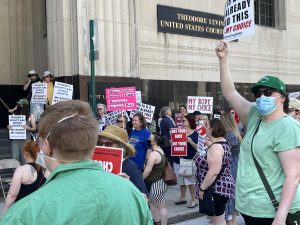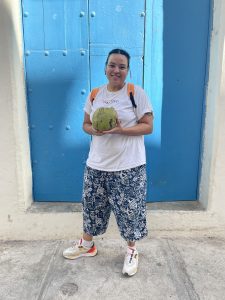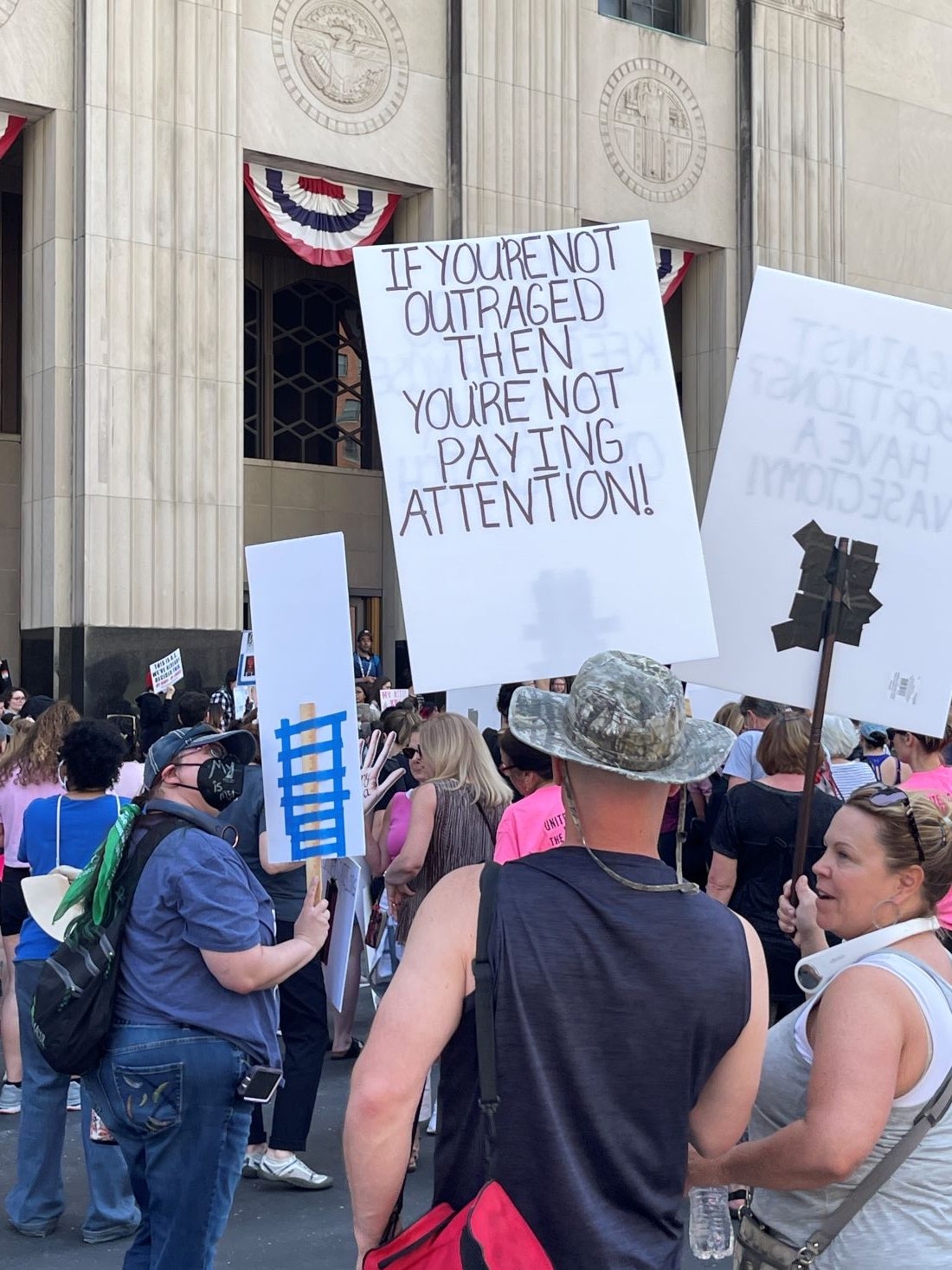On June 24th, 2022, the United States Supreme Court ruled against constitutional protections for the right to receive an abortion. For one this ruling has massive implications for bodily autonomy in this country as it sets a precedent that we are no longer guaranteed privacy in making reproductive decisions. Nearly overnight, clinics nationwide were forced to close their doors in the face of trigger bans and increased restrictions; further limiting the options for accessing abortion care in an already sparse network of providers and clinics. Physicians and patients alike are now facing criminal and civil penalties simply for their proximity to abortion care services. However, the unprecedented leak of the decision in the weeks preceding the ruling brought about something incredible. As an abortion doula and sex educator, I witnessed firsthand how the floodgates burst as mutual support and resources poured in. Community networks, abortion funds, reproductive justice organizers, and healthcare workers all rushed to build infrastructures to protect abortion care access by any means necessary.
Across the country, people hustled to learn at-home abortion management and traded resources for receiving services across state lines – there was a massive collective investment in crafting solutions as the clock to the official ruling ticked down. Abortion pills were shipped out, abortion funds boosted their monetary goals in anticipation of increasing calls, and lawyers filed injunctions to halt trigger bans. But the climate around abortion has been fraught and worsening for years – its legacies extending back further than the protections were guaranteed under Roe. So, why has it taken us this long to tackle enshrining the right to reproductive freedom given the constant threats? And what can we learn in Michigan about reaching for the highest standard of care in the wake of these attacks on bodily autonomy?
Towards #ReproductiveFreedomForAll or To #RestoreRoe
So far, Michigan has responded to the Dobbs decision with Proposal 3, also called Reproductive Freedom For All. This ballot measure proposed a change to the Michigan State Constitution, enshrining the right to comprehensive reproductive care for all individuals as of its passage in Fall 2022. The language of the amendment has four key components: (1) Establish new individual rights to reproductive freedom, including the right to make and carry out all decisions about pregnancy, such as prenatal care, childbirth, postpartum care, contraception, sterilization, abortion, miscarriage management, and infertility; (2) Allow the state to regulate abortion after fetal viability, but not prohibit if medically needed to protect a patient’s life or physical or mental health (3) Forbid state discrimination in the enforcement of this right; prohibit prosecution of an individual, or a person helping a pregnant individual, for exercising rights established by this amendment; (4) Invalidate state laws conflicting with this amendment.
Undoubtedly, this is a significant win for the future of reproductive care and rights in Michigan. All individuals with the capacity to carry a pregnancy now have the right to do so regardless of gender identity and cannot face criminalization within the state for pursuing reproductive care. It nullifies the 1931 criminal ban on abortion that was temporarily enjoined but still in place – one that would have instituted a total ban across the state. The labor of the campaign organizers, advocacy groups, and the governor herself made the passage of this landmark decision possible.3It took the efforts of canvassers, neighbors, coalitions, families, and friends to have open and transparent conversations about abortion care to pass Proposal 3. Its passage reflects the overwhelming support for a future where accessible abortion care exists for all.
If you drove around Detroit in the weeks leading up to Election day you probably saw the orange and purple yard signs emblazoned with YES ON PROP 3. Many of the posts in support of Prop 3 were accompanied with the slogan #ReproductiveFreedomForAll – however the central campaign slogan of Prop 3 was to ‘Restore Roe in Michigan’.4 But do these two slogans create the same changes? Reproductive justice happens when “all people hav[e] the social, political, and economic power and resources to make healthy decisions about their gender, bodies, sexuality, and families for themselves and their communities”.5 Reproductive justice, therefore, is how we arrive at reproductive freedom. The protections under Roe have never been sufficient to meet the needs of the people most impacted by bans, restrictions, and other barriers to reproductive care. Proposal 3 gives us the skeleton to make reproductive freedom a reality in Michigan, but it’s not yet complete. Legality does not create access to abortion care.
Beyond Legality: Fighting for Expanded Access
Michigan is the 3rd state in the Midwest to enshrine the right to abortion care and reproductive freedom. Illinois was the first to do so, becoming a sanctuary state for reproductive care in the region in 2019.6 Minnesota has since followed suit as of January 31st, 2023 with the governor enshrining the “fundamental right” replacing the protections in place from the 1995 Minnesota Supreme Court ruling. Minnesota and Illinois are both rated as states with ‘Expanded Access’ to abortion care by the Center for Reproductive Rights. Michigan’s rating is at the next tier below as a state where abortion is “Protected”. There are key factors in the landscape for access in IL & MN that differ from Michigan. Michigan does not have statutory protections in place nor does it require public funding or insurance requirements for abortion care. This is where stopping our efforts at legality harms our chances of achieving reproductive freedom for ALL. Michigan has to strive to become another state where Expanded Access is the minimum acceptable outcome toward reproductive freedom. As the legal mechanisms slowly move to shift policies in alignment with the amendment, we must be attentive that these changes reflect the need for reproductive freedom as outlined by the tenets of reproductive justice. Those needs include public funding for abortion care, coverage under state Medicaid, evaluating clinic standards to reflect safety with minimal barriers, and requiring private insurance to cover abortion care in-state. It requires removing unnecessary waiting periods for care and ensuring all legislation that follows continues to address reproductive care for individuals without gendered exclusions that harm transgender and intersex people. For this amendment to matter in a political climate hostile to abortion care and bodily autonomy, we must be bold in our standards for the care we all deserve.
Imagining Abortion Justice Futures
The passage of Prop 3 demonstrates that Michiganders care about a future where reproductive freedom exists for all statewide. While we have leaped closer to that goal, we are just beginning to see the tangible changes occur for it to be a reality. The barriers in place now must change to reflect what Prop 3 revealed: bodily autonomy is a right for all in Michigan. If it matters for those who can afford the cost of abortion care, childcare, transportation, and private insurance riders, then it also has to impact the experience of the people for whom that is not true.
Reproductive freedom in Michigan is on its way when a single parent working multiple jobs to support her family can receive abortion care without losing a job or losing money meant to pay for rent and bills. Reproductive freedom happens when a disabled trans man can arrange safe transportation from Medicaid to go to the clinic of his choice, receive care without interrogations, and get his care covered without spending hours advocating with insurance companies. #ReproductiveFreedomforAll is a ways away, but there is hope in the passage of Prop 3. We learned from the success of this campaign that when we fight for each other we win.
A Plea for the Love of Bodily Autonomy
A cultural shift is underway around reproductive care and abortion in this country. How we think about abortion has to change to craft systems for accessibility to make reproductive freedom a reality. 2022 was a year where one phrase kept returning to the front of my mind: bodily autonomy. Between masking mandates, questionable vaccine distribution, long covid debates, and calls from immunocompromised people for continued safety precautions – we have all had to sit with the question of who decides what is best for us and our bodies. No one who survived the last few years of this pandemic has been able to avoid reflecting on what we owe each other in the name of our collective health and how we protect our agency in making healthcare decisions.
Abortion care and the right to access it safely, securely, and without unnecessary barriers is another frontline in the question of who has the right to bodily autonomy in the United States. What I loved most about the campaign strategy for Prop 3 was that volunteers were encouraged to talk to people who were already ready to support people who get abortions. It was rooted in an ethic of care – supporting people already prepared to protect the legality of abortion care to exercise their right to vote. A network of mutual support was birthed through this campaign, one that still has a purpose today. I hope we can continue to support each other in the wake of the amendment passage. It is imperative to ensure this is a victory for many and not just for some. This year is essential to ensure the rights guaranteed by Prop 3 become realized.

If you are looking for ways to stay involved and informed about policy changes, the landscape for abortion access, and efforts to keep abortion safe, legal, and accessible, you can start by connecting with and supporting these organizations and groups: Mothering Justice, Michigan Coalition for Reproductive Liberation, Michigan Voices, Reclaim MI WIN Fund (SE Michigan), YWCA Kalamazoo Reproductive Health Fund, Midwest Access Coalition, Chicago Abortion Fund, National Network of Abortion Funds, Center for Reproductive Rights, or volunteer with local clinic escorts like Gamp Camp (@gampcampescorts on Instagram)
LINKS TO GROUPS NAMED
– https://www.motheringjustice.org/
– https://www.michiganvoices.org/
– https://www.ywcakalamazoo.org/what-we-do/advocacy-systems-change/reproductive-he alth-fund
– https://reclaimproject.org/abortion-funding/
– https://abortionfunds.org
– https://reproductiverights.org/
– https://www.midwestaccesscoalition.org
– https://www.chicagoabortionfund.org
– https://instagram.com/gampcampescorts
– https://instagram.com/reproductive_liberation_mi
WORKS CITED
- “Abortion Laws by State – Interactive Map.” Center for Reproductive Rights, 6 Jan. 2023, https://reproductiverights.org/maps/abortion-laws-by-state/.
- Ballot Proposal 3 of 2022 – House.mi.gov.
https://www.house.mi.gov/hfa/PDF/Alpha/Ballot_Proposal_3_of_2022.pdf. ● “Governor Whitmer Signs Executive Directive Affirming Reproductive Freedoms.” SOM – State of Michigan, 14 Dec. 2022,
https://www.michigan.gov/whitmer/news/press-releases/2022/12/14/governor-whitmer-si gns-executive-directive-affirming-reproductive-freedoms.
- Harmon, Stephanie. “U.S. Supreme Court Takes Away the Constitutional Right to Abortion.” Center for Reproductive Rights, 6 July 2022,
https://reproductiverights.org/supreme-court-takes-away-right-to-abortion/. ● Kashiwagi, Sydney. “Minnesota Governor Signs Bill Codifying ‘Fundamental Right’ to Abortion into Law | CNN Politics.” CNN, Cable News Network, 1 Feb. 2023, https://www.cnn.com/2023/01/31/politics/minnesota-abortion-access/index.html.
- “Michigan Voters Overwhelmingly Support Abortion Rights in 2022 Election.” Planned Parenthood of Michigan, Plannedparenthoodmi, 9 Nov. 2022,
https://www.miplannedparenthood.org/post/michigan-voters-overwhelmingly-support-abo rtion-rights-in-2022-election.
- “What Is Reproductive Justice?” Forward Together, 19 July 2019,
https://forwardtogether.org/what-is-reproductive-justice/.
- “Whitmer Calls on Michigan Insurers to Ensure Women Have Coverage for Reproductive Health Care.” SOM – State of Michigan, 29 June 2022,
https://www.michigan.gov/whitmer/news/press-releases/2022/06/29/whitmer-calls-on-mic higan-insurers-to-ensure-women-have-coverage-for-reproductive-health-care.

BIO
darien hunter golston (as written; pronouns – ey/em/eir or d) is an earthkeeper, land steward, artist, and full spectrum doula living between Waawiyatanong and Zhigaagoong (Detroit & Chicago, respectively). For em, land stewardship is about laboring towards Black liberation by nurturing kinship between people and the land. darien grows flowers, herbs, and textiles in support of achieving reproductive justice. d arrived at earthkeeping in 2020 following a decades-long journey working in sexuality education, domestic violence intervention services, abortion justice campaigns, police/prison abolition, and through struggles for bodily autonomy across the Midwest.
darien enjoys spending eir outside of work cooking, roller skating, playing in the water, and upcycling materials for the crafting project of the moment. Writing is a quiet passion for d that ey is flexing through sharing this piece with Riverwise. It is an honor to contribute to a publication that uplifts the people’s power in Detroit.


